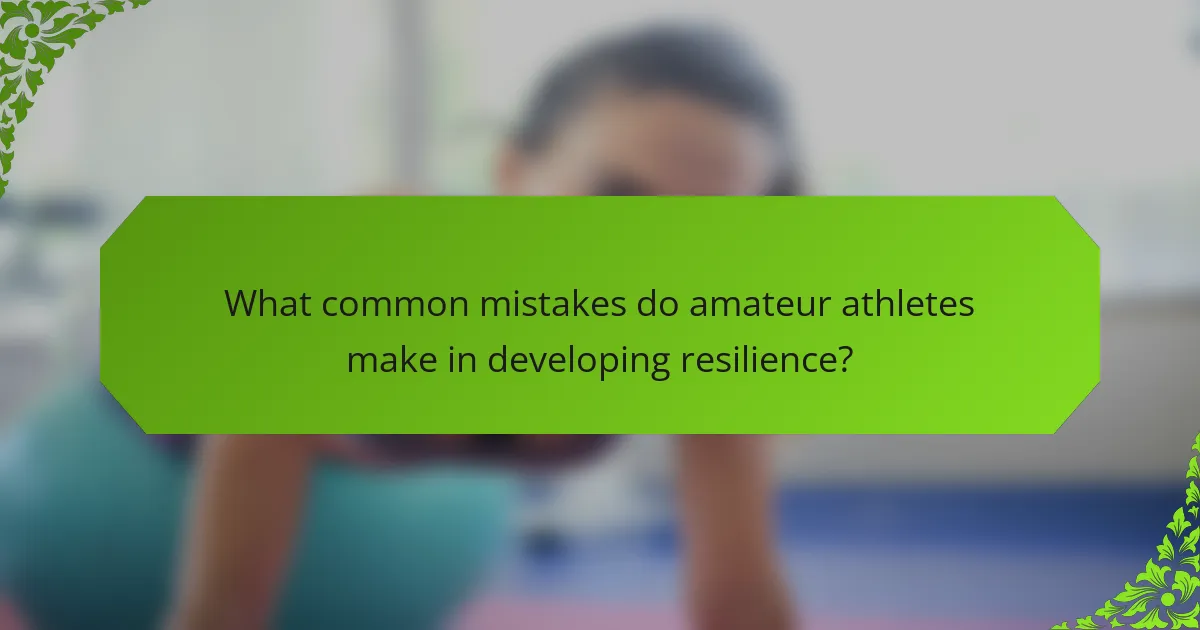Building resilience and grit is crucial for amateur athletes facing challenges in their sports journey. Key strategies include consistent goal-setting, positive self-talk, and stress management techniques like mindfulness and visualization. These practices enhance mental toughness and foster a growth mindset, enabling athletes to overcome obstacles more effectively. Engaging in regular self-reflection and seeking feedback can further strengthen their psychological resilience.

What are the key components of resilience and grit in amateur athletes?
Resilience and grit in amateur athletes involve mental toughness, adaptability, and perseverance. Key components include goal-setting, positive self-talk, and stress management techniques. Goal-setting provides direction and motivation, while positive self-talk enhances confidence. Stress management techniques, such as mindfulness and visualization, help athletes cope with challenges. Together, these practices foster a resilient mindset essential for overcoming obstacles in sports.
How does mental toughness influence athletic performance?
Mental toughness significantly enhances athletic performance by fostering resilience and grit in amateur athletes. This psychological trait enables athletes to overcome challenges, maintain focus, and push through adversity. Research indicates that mentally tough athletes exhibit higher levels of perseverance and commitment, leading to improved performance outcomes. For instance, a study found that athletes with strong mental toughness are 25% more likely to achieve their personal bests during competitions. Developing mental toughness through specific practices, such as visualization and goal-setting, equips athletes with the tools to handle pressure effectively. Consequently, mental toughness is a unique attribute that differentiates successful athletes from their peers.
What psychological traits define resilient athletes?
Resilient athletes exhibit traits such as mental flexibility, optimism, and strong goal orientation. These psychological characteristics enable them to adapt to challenges, maintain a positive outlook, and pursue objectives relentlessly. Mental toughness is reinforced through practices like visualization, self-talk, and mindfulness, fostering grit and perseverance. Research indicates that these traits can significantly enhance performance and recovery in competitive environments.
How can self-discipline enhance grit?
Self-discipline significantly enhances grit by fostering consistency and perseverance in amateur athletes. When athletes practice self-discipline, they develop the ability to stay focused on their goals despite challenges. This commitment leads to a stronger mindset, allowing them to push through difficulties and maintain motivation. Additionally, self-discipline cultivates habits that reinforce resilience, making athletes more adaptable to setbacks. As a result, they can sustain their efforts over time, which is a core component of grit.
What role does emotional regulation play in resilience?
Emotional regulation significantly enhances resilience by enabling athletes to manage stress and recover from setbacks effectively. It fosters mental toughness, allowing individuals to maintain focus and motivation during challenging situations. Research indicates that athletes with strong emotional regulation skills demonstrate higher levels of grit, which is crucial for long-term success. By effectively managing their emotions, athletes can improve performance, sustain effort, and navigate the ups and downs of competitive sports.

What universal practices can build resilience and grit?
Practices that build resilience and grit in amateur athletes include consistent goal setting, mental visualization, and positive self-talk. These universal practices enhance mental toughness and promote a growth mindset.
Goal setting helps athletes define clear, achievable objectives, fostering motivation and focus. Mental visualization allows athletes to mentally rehearse their performance, increasing confidence and reducing anxiety. Positive self-talk encourages a supportive internal dialogue, reinforcing belief in their abilities.
Incorporating these practices regularly can lead to improved performance and a stronger psychological foundation.
How does goal setting contribute to mental toughness?
Goal setting significantly enhances mental toughness by providing clear objectives and a sense of purpose. It fosters resilience through structured progress and accountability, helping athletes overcome challenges. Research shows that athletes with specific goals exhibit higher levels of grit and determination, which are crucial for sustained performance. Additionally, setting achievable milestones builds confidence, reinforcing a positive mental state essential for enduring adversity.
What are effective visualization techniques for athletes?
Visualization techniques for athletes enhance mental toughness and resilience. Effective methods include mental imagery, where athletes visualize success; guided imagery, which involves relaxation and visualization; and performance routines that incorporate visualization before events. These techniques improve focus, confidence, and emotional regulation. Regular practice can lead to significant gains in performance and grit.
How can positive self-talk improve performance?
Positive self-talk enhances performance by boosting confidence and focus. It helps athletes develop a resilient mindset, enabling them to tackle challenges effectively. Research indicates that positive affirmations can reduce anxiety and improve overall mental well-being, leading to better outcomes in competitive situations. By replacing negative thoughts with constructive dialogue, athletes can foster grit and perseverance, essential traits for success in sports.

What unique strategies are particularly effective for amateur athletes?
Amateur athletes can enhance mental toughness through specific strategies. Techniques such as visualization, goal-setting, and mindfulness are particularly effective.
Visualization helps athletes mentally rehearse performance, boosting confidence and focus. Goal-setting fosters motivation by providing clear benchmarks for progress. Mindfulness practices enhance self-awareness and emotional regulation, crucial for resilience during challenges.
Additionally, developing a growth mindset encourages athletes to view setbacks as opportunities for learning. Regularly reflecting on experiences strengthens grit, reinforcing the mental resilience needed for sustained athletic performance.
How can community support foster resilience?
Community support fosters resilience by providing emotional encouragement, practical resources, and a sense of belonging. This support enhances mental toughness in amateur athletes, enabling them to overcome challenges. Engaging with peers creates a network that shares experiences, which builds grit and determination. Furthermore, studies show that athletes with strong community ties report higher levels of motivation and lower stress, reinforcing their ability to persist through adversity.
What role do mentorship and coaching play in developing grit?
Mentorship and coaching are crucial in developing grit by providing guidance and support. They foster resilience through personalized feedback and accountability. Coaches instill discipline, while mentors share experiences that inspire perseverance. This relationship enhances an athlete’s mental toughness, enabling them to overcome challenges effectively.

What rare practices can set athletes apart in building mental toughness?
Engaging in rare practices can significantly enhance mental toughness in amateur athletes. Techniques such as visualization of failure, embracing discomfort through cold exposure, and practicing gratitude journaling are effective. These methods cultivate resilience and grit, setting athletes apart in their training.
How can unconventional training methods enhance resilience?
Unconventional training methods can significantly enhance resilience by fostering adaptability and mental toughness. These methods, such as high-intensity interval training or obstacle courses, challenge athletes to push beyond their comfort zones. As a result, athletes develop grit and perseverance, essential traits for overcoming adversity in sports and life. Incorporating varied training stimuli helps athletes learn to cope with stress and unpredictability, enhancing their overall mental fortitude.
What are the benefits of cross-training for mental toughness?
Cross-training enhances mental toughness by fostering resilience and adaptability. It exposes athletes to varied challenges, improving problem-solving skills under pressure. This practice builds grit, as athletes learn to cope with discomfort and setbacks in diverse environments. Additionally, cross-training promotes a growth mindset, encouraging athletes to embrace challenges as opportunities for development.

What common mistakes do amateur athletes make in developing resilience?
Amateur athletes often make critical mistakes in developing resilience, such as neglecting mental training, underestimating recovery, and avoiding challenges. They frequently focus solely on physical conditioning, ignoring the psychological aspects essential for grit. Additionally, many athletes set unrealistic goals, leading to frustration and burnout. They may also lack a support system, which is crucial for emotional resilience. Finally, some athletes fail to learn from setbacks, missing opportunities for growth.
How can overtraining impact mental toughness?
Overtraining can significantly undermine mental toughness by increasing stress and anxiety levels. This mental strain diminishes an athlete’s resilience and grit, leading to burnout. Overtraining disrupts motivation and focus, essential attributes for mental toughness. As a result, athletes may experience decreased performance and heightened emotional instability. Prioritizing recovery and balance is crucial to maintain mental fortitude.
What are the pitfalls of negative self-talk?
Negative self-talk can undermine mental toughness and resilience in amateur athletes. It leads to decreased self-esteem, increased anxiety, and impaired performance. Negative thoughts create a cycle of doubt that affects motivation and focus. As a result, athletes may struggle to overcome challenges and develop grit. Recognizing and addressing these pitfalls is essential for fostering a positive mindset and enhancing overall athletic performance.

What actionable tips can athletes implement to strengthen their grit?
Athletes can strengthen their grit by implementing specific mental toughness practices. Focus on setting realistic goals, maintaining a positive mindset, and embracing challenges.
1. Set specific, measurable goals to track progress and maintain motivation.
2. Cultivate a growth mindset by viewing setbacks as learning opportunities.
3. Practice mindfulness techniques to enhance focus and reduce anxiety.
4. Engage in consistent self-reflection to assess performance and areas for improvement.
5. Develop a routine that includes physical and mental training for resilience.
6. Seek feedback from coaches and peers to foster accountability and growth.
How can athletes create a personalized resilience plan?
Athletes can create a personalized resilience plan by identifying their mental challenges, setting specific goals, and incorporating coping strategies. Begin by assessing stressors and emotional responses during competition. Next, establish measurable objectives that enhance mental toughness. Incorporate techniques like visualization, mindfulness, and positive self-talk. Regularly review and adjust the plan based on performance and emotional feedback to ensure continuous improvement.
What daily habits can reinforce mental toughness?
Daily habits that reinforce mental toughness include consistent goal setting, visualization techniques, and regular self-reflection. Engaging in physical exercise enhances resilience and discipline. Practicing mindfulness reduces stress and improves focus. Developing a growth mindset fosters adaptability and perseverance. These practices collectively build grit in amateur athletes, enhancing their performance and mental fortitude.
How can journaling track progress and setbacks?
Journaling effectively tracks progress and setbacks by providing a structured way to reflect on experiences. It allows amateur athletes to document their training, emotions, and challenges, fostering self-awareness. Regular entries can reveal patterns in performance, highlighting areas for improvement and celebrating achievements. This practice enhances mental toughness by promoting resilience through consistent reflection.
What role does reflection play in building resilience?
Reflection plays a crucial role in building resilience by enabling athletes to learn from experiences. It fosters self-awareness and helps identify strengths and weaknesses. Regular reflection can lead to improved mental toughness and grit. Studies show that athletes who engage in reflective practices demonstrate higher levels of resilience, which enhances performance under pressure. This process encourages a growth mindset, allowing athletes to adapt and thrive in challenging situations.



